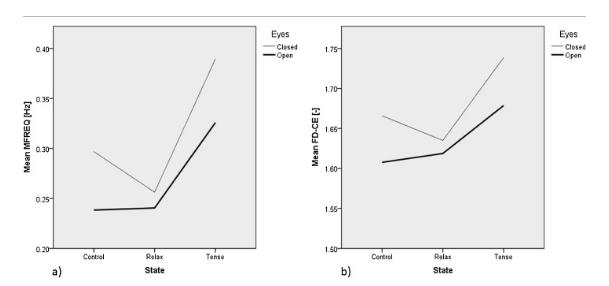A study by Simone Tassani, Miguel Ángel González Ballester and Jérôme Noailly, members of BCN MedTech, with the participation of Josep M. Font-Llagunes, a researcher at the UPC, published in the journal Gait & Posture

Credit: UPF
Muscle co-contraction is a strategy used commonly in elderly people to increase their stability. Co-contraction involves the simultaneous contraction of pairs of muscles from opposing groups to lock a joint and provide stability.
However, co-contraction can also lead to stiffness, which in turn reduces stability, which is why some authors have suggested the opposite approach by pointing to relaxation as a way to improve stability. However, many studies do not clarify whether tension or relaxation is the more effective strategy.
In turn, in our society relaxation is a misleading concept because it tends to be confused with rest when it is actually a mechanism that reduces energy expenditure and increases stability during stress. The inability to relax may be related to suboptimal neuro-motor control that can lead to increased tension.
A study carried out by Simone Tassani, first author of the paper, Miguel Ángel González Ballester, ICREA research professor and Jérôme Noailly, members of BCN MedTech of the Department of Information and Communication Technologies (DTIC) at UPF, with the participation of Josep M. Font-Llagunes, a researcher at the UPC, has shown that muscle tension significantly reduces subjects’ stability. The article is published online in the journal Gait & Posture and will be included in volume 68 of February.
The goal of the study was to investigate the effect in humans of voluntary muscle contraction and relaxation on the stability of the standing posture to find out if muscle tension has an impact on stability and to estimate this impact using minimally invasive procedures. Therefore, the authors use force plates to measure the pressure centre in a standing position, in balance studies in 30 volunteers during states of tension and relaxation, and in two visual situations, eyes open and eyes closed.
The results showed that muscle tension significantly reduces the subjects’ stability. Simone Tassani, first author of the article says: “Our results show that daily stress situations can lead to a decrease in stability. A loss of stability may increase the risk of chronic overload or falling”.
In addition, the study shows that breathing has a direct effect on pain and stress management and Tassani adds: “the results presented here demonstrate the need to explicitly explore the worrying fact that a large part of the population might not be able to breathe properly”. Indeed, one of the conclusions of the study is that for many young subjects, abdominal breathing seems to be a difficult task. Finally, the study also showed that in a standing position, vision has an interaction effect with relaxation.
###
Media Contact
Nuria Pérez
[email protected]
Related Journal Article
http://dx.




